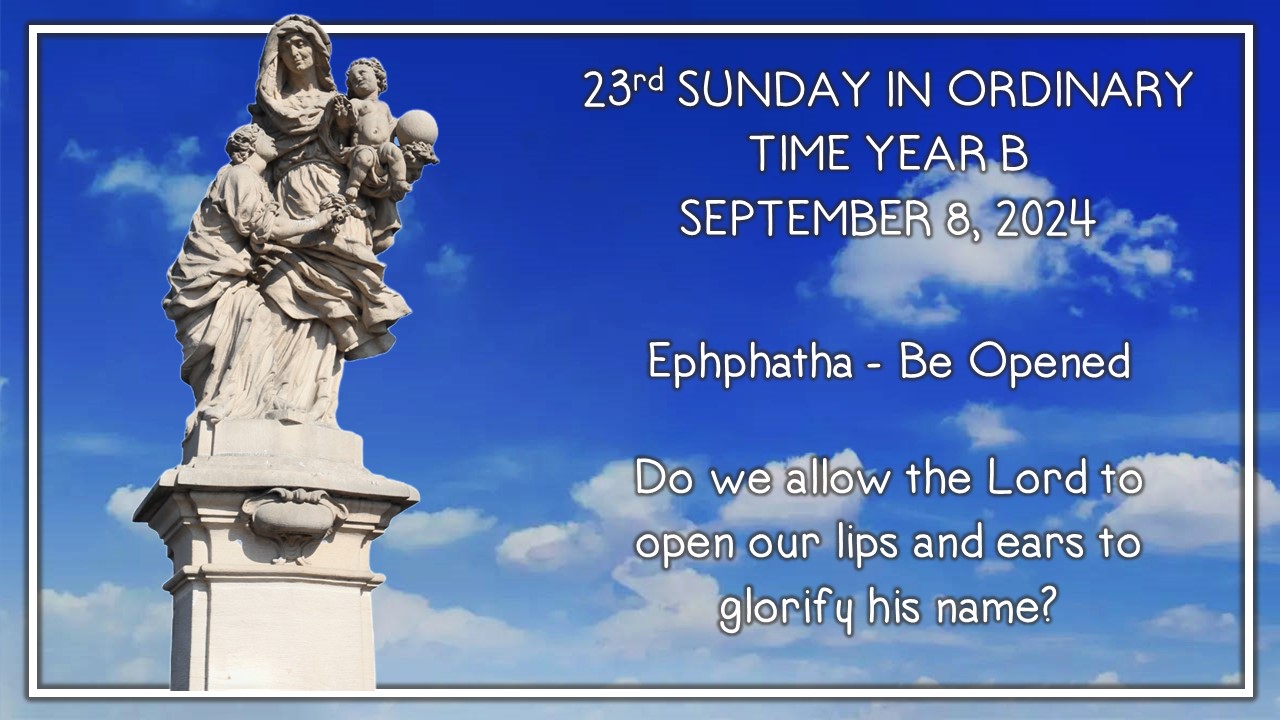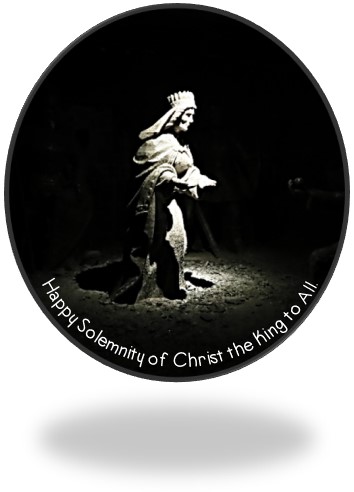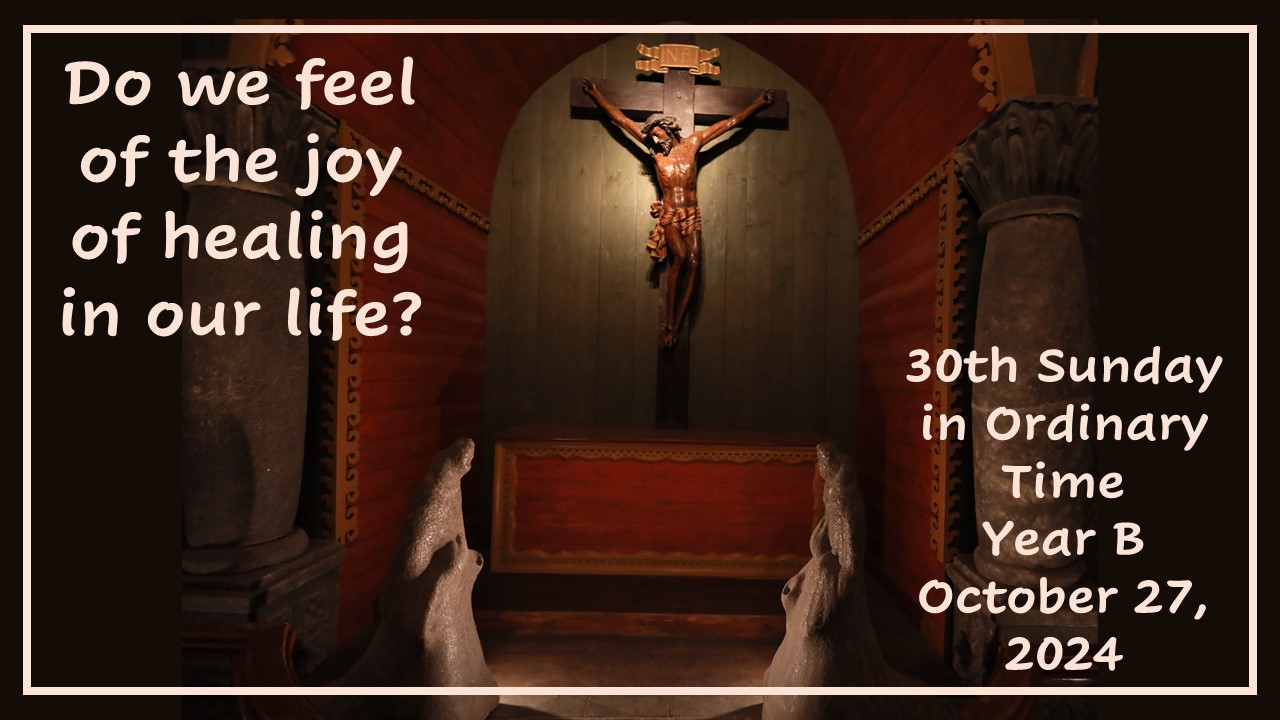
23rd SUNDAY IN ORDINARY TIME YEAR B ~ SEPTEMBER 8, 2024
EPHPHATHA – BE OPENED
Last Sunday we reflected on the purification of our inner selves. We are called to keep ourselves unstained by the world and let our hearts be pure from any evil or defilement of the world. Today we are invited to allow the Lord to open our ears and tongue to listen and speak. Let me share a story with you.
Every evening, there was a crowd of devotees in the monastery to listen to a well known and renowned monk who gave the right direction and understanding of life. A young man used to listen to his discourse everyday. One day when the discourse was over, he went to the monk and said, “I have been listening to your discourses for a long time but after leaving from here, I am not able to follow the same good conduct in my household life as I hear here. Due to this, I started to doubt the importance of discourses. What should I do?” Listening to this the monk gave a bamboo basket to the young man and asked him to bring water in it. But the young man failed to fill the basket with water. However, monk asked him to continue bringing water in the same basket daily. The young man tried to fill the basket with water everyday but could not succeed. After a few days, the monk asked him, “do you see any difference in the basket after pouring water in it continuously for so many days?” The young man said, “Yes, there is difference, earlier dirt used to accumulate in basket, but now it looks clean. No dirt is visible, and its hole are not as big as before. They become very small.” The monk explained, “if you keep putting it in water like this, then in few days these holes will swell and close and you will be able to fill the basket with the water”. The same way you if allow your ear to my discourse and open you heart and mind to understand, it will fill your life with wisdom and knowledge. The key is to listen and open yourself to understanding.
In our human life we have basic senses which help us to see, smell, touch, hear and taste and these senses complete our life and help us to enjoy the beauty of the creation. However, beside these senses, we need to experience something totally different to express ourselves and that is called speaking. If we lack any of them, our life becomes incomplete. In present age, big thanks to science that people are getting sight restored and they are able to hear via audio devices. God has blessed us with such great gifts that one can ever think about it. We are given a tongue to speak and proclaim his name to others and ears to hear his voice and listen to his voice to amend our lives according to his good pleasure (Please read Revelation 2 & 3 chapters).
Restoration of sight to the blind and the power of speech to the dumb and the power of hearing to the deaf were part of the messianic expectations. This was at the center of the prophecy we read today in the First Reading. The lines of this reading recapture the prophetic voice and words of deliverance from God through the prophet and to God’s people who were facing a very turbulent and difficult time in their history as a people. A period of crisis that could be likened to ours, not just for the world at large but particularly to us a Church, as the Family of God, at this point, in the words of Pope Benedict XVI, “even when the boat has taken on so much water as to be on the verge of capsizing.” It was exactly in such moment that God spoke to His people, as He is speaking to us afresh today that “the eyes of the blind shall be opened, the ears of the deaf unsealed, then the lame shall leap like a deer and the tongues of the dumb sing for joy.” It is often the temptation to stop at a literal and superficial understanding of these prophetic lines. Much deeper than that, God invites us to a special form of encounter that not only liberates us physically, but that which also spiritually emancipates us and empowers and places us at the forefront to successfully realize our mission as sons and daughters of God. Someone said, “Prayer at its highest is a two-way conversation – and for me the most important part is listening to God’s replies”. St. Augustine once said “Remember this. When people choose to withdraw far from a fire, the fire continues to give warmth, but they grow cold. When people choose to withdraw far from light, the light continues to be bright in itself, but they are in darkness. This is also the case when people withdraw from God”.
God not only gives us to the power to listen but to speak as well. How do we use these powers, all depends on us. Maybe we can compare these powers with the following story:
The Wind and the Sun were disputing which was the stronger. Suddenly they saw a traveller coming down the road, and the Sun said: “I see a way to decide our dispute. Whichever of us can cause that traveller to take off his cloak, shall be regarded as the stronger. You begin.”
So, the Sun retired behind a cloud, and the Wind began to blow as hard as it could upon the traveller. But the harder he blew the more closely did the traveller wrap his cloak round him, till at last the Wind had to give up in despair.
Then the Sun came out and shone in all his glory upon the traveller, who soon found it too hot to walk with his cloak on.
This Sunday’s Gospel passage refers to the episode of the miraculous healing by Jesus of a man who was deaf and had a speech impediment. They brought to him a deaf and dumb man, beseeching Him to lay a hand upon him. Instead, He performed two different gestures upon him: first, He took the man aside, far from the crowd. On this occasion, as on others, Jesus always acts with discretion. He does not want to impress people; He is not seeking popularity or success but wishes only to do good to people. With this attitude, He teaches us that good is to be done without clamour, without ostentation, without “blowing one’s trumpet”. It should be done quietly.
When they had drawn aside, Jesus put his fingers in the deaf man’s ears and touched his tongue with saliva. This gesture refers to the Incarnation. The Son of God is a man inserted into human reality: he became man; therefore, he can understand another man’s distressing condition and intervene with a gesture which concerned his own humanity. At the same time, Jesus wanted to make it understood that the miracle occurred because of his union with the Father: for this reason, he looked up to heaven. He then sighed and said the decisive word: “Ephphatha”, which means “Be opened”. And immediately the man was healed: his ears were opened; his tongue was released. For him the healing was an “opening” to others and to the world.
It is very glaring that we are living in a time where we hear more of vices than of virtues. In a time where virtuous living seems to be the abnormal way of life whereas vices are praised with the loudest of voices and with the grandeur of visual glamour. Hence, the problem of our time goes beyond that of being deaf to the physical sound of things but much deeper to being deaf to the voice of virtue and God-founded values. Hence the sound of ‘Ephphatha’ we need to hear in our times is not just to open our physical ears, for that would be the greatest limitation of the power of God, but also our inner ears to hear what the Lord says to us and to loosen the ligaments of our tongues to announce what we have heard to everybody. Beyond the restoration of the man’s power of speech, this man received, together with those around him the grace to recognize the divine power at work in Jesus Christ, the values Jesus stood for and embodied in His person and also the boldness to speak about God “He has done all this well, He makes the deaf hear and the dumb speak.” Have you had an experience of this ‘Ephphatha?
By virtue of our baptism, we have all made the same experience with the deaf man of today. Our ears have been opened and the ligaments of our tongues loosened. The problem we have is that we allow this persecutive and deafening noise of vices to silence us into confusion and uncertainty and uncharitable empathy for evil and the destruction of our families and societies by injustice and exploitation of the poor and the vulnerable. In the words of the Second Reading (James 2:1-5) we have been pushed into the use of standards that demeans the values we profess and should defend. The Word of God is charging us once more today to be the voice of the voiceless, to stand against injustice and to speak and witness in words and deeds the Good news that we carry for “all that is necessary for the triumph of sin and vice is for good men and women to keep mute and do nothing.”
Through the miracle in the Gospel today, we are given the choice to listen to his voice and proclaim it others. By listening we become obedient and by becoming obedient we become faithful to him who never denies us. Let me conclude my reflection with his wonderful story to remind us to avoid listening to the world as it brings wonderful attraction to us but only to listen to the Lord’s voice (Read Psalm 95) to live and proclaim his name.
Once a spider was looking for a suitable place to make its web. He wanted his web to be in such a place where a lot of insects and flies would come and get trapped in his web. In this he wanted to spend his life eating, drinking and relaxing with pleasure. Soon, he found a corner of room and started preparing to make his web there. Just when he started weaving the net, a cat passing by started laughing loudly after seeing him, when spider saw the cat laughing, he asked, “why are you laughing?” cat replied, “I am laughing at your stupidity, can’t you see how clean this place is. No flies or insects will come here. Who will fall in our web?”
After listening to cat, spider gave up the idea of making web in that corner and started looking for another place. Then he saw a window and started weaving his net there. Spider had prepared half of his net, then a bird came there and started making fun of him saying, “have you lost your mind? Why are you weaving your net in this window? A strong wind will blow, and your net will fly away.” The spider understood and stopped weaving the net on the window and started looking for another place. While searching his eyes fell on an old cupboard. The door of that cupboard was slightly open. He went there and started weaving net.
Just then a cockroach came there and while explaining to him said, “it is useless to make net at this place. This wardrobe is very old. It will be sold in few days. All your hard work will go in vain. The spider listened to the advice of cockroach and stopped making the web in cupboard and started searching for another place. But in midst of all this, a whole day passed. He was tired and was suffering from hunger and thirst and didn’t have any energy left to make a net.
Exhausted, he sat down in one place. An ant who was seeing all this, went to spider and said, “I have been watching you since morning. You start weaving a web and leave it incomplete after listening to others. You were influenced by words of others and didn’t complete your net. If you listen to other, failure is on your way”.
Let the voice of the Lord inspire us to do whatever we can to have strong relationships with him. ‘See, I waited for your words, I listened for your wise sayings, while you searched out what to say (Job 32:11).
Do we allow the Lord to open our lips and ears to glorify his name?
Other Sermons In This Series
SOLEMNITY OF ST. PETER & ST. PAUL ~ JUNE 29, 2025
June 26, 2025

Solemnity of Christ the King (34th Sunday) Year C ~ November 20, 2022
November 18, 2022

30TH SUNDAY IN ORDINARY TIME YEAR B ~ OCTOBER 27, 2024
October 24, 2024

